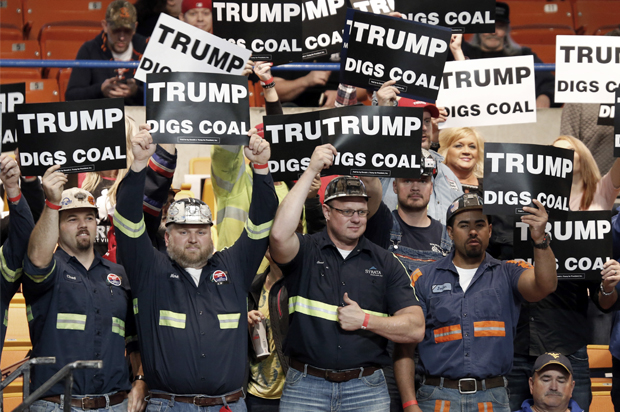Despite President Donald Trump’s brags, it’s not a good time to be a coal miner.
Right now, Appalachia is seeing a wave of former coal miners resist job retraining due to their hope that their old coal mining jobs will return, according to Reuters. One of the main reasons cited for feeling this way is easy to sneer at — namely, that they actually believe Trump when he says he will bring back coal jobs (he won’t).
Other reasons, however, are not only sympathetic but actually pretty logical. Per Reuters:
Out-of-work miners cite many reasons beyond faith in Trump policy for their reluctance to train for new industries, according to Reuters interviews with more than a dozen former and prospective coal workers, career counselors and local economic development officials. They say mining pays well; other industries are unfamiliar; and there’s no income during training and no guarantee of a job afterward.
“From my POV, the missing piece to the Reuters story isn’t cultural but economic,” Elizabeth Catte, a public historian and writer, told Salon. “I’m surprised the author didn’t, for example, look at data from 2015 (before Trump became a viable political candidate) and compare that to the present — is the poor uptake for coal re-training programs specific to the Trump presidency or was this an issue in previous years?”
Another thing that the article overlooked is that, even though coal mining jobs do not define Appalachia as much as the Trump-promoted stereotype of the region would have you think, that doesn’t mean those jobs aren’t attractive.
“In 2016, the health care sector employed over 99,000 people in West Virginia while coal mining employed just under 12,000. Meanwhile, total wages in the health care sector were $4.7 billion compared to under $1 billion for coal mining,” Ted Boettner, the executive director of the West Virginia Center on Budget and Policy, told Salon in July. “However, coal mining jobs pay about $30,000 more per year on average than health care sector jobs and require less formal education. Coal is still the #1 state export for [West Virginia].”
What’s more, while the Reuters piece expressed dismay at laborers in coal mining regions not signing up for job retraining programs, it ignored that many of those programs haven’t been particularly effective. As one evaluation conducted by Mathematica Policy Research and Social Policy Research Associations discovered, recipients of the Training Adjustment Assistance Program received no significant benefits over their non-retrained counterparts when it came to employment rates or earnings.
“It certainly makes for a spicy take to begin and end with a tableau about a stubborn coal miner dug into wait on better days but the reality is that these programs are historically unpopular and deliver unconvincing results,” Catte told Salon.
Perhaps part of the reason they don’t deliver results is that, instead of listening to Appalachian communities about the economic variables that dictate employment in their region, outsiders tend to apply one-size-fits-all approaches to job retraining without regard to the lack of results.
“One of the big flaws in training programs starting in the ’60s until around 2000 was we forgot that employers have to want to hire these people. Instead of just training people for whatever the community college has the facilities for, we should be asking employers what they need, and training for those,” Burt Barnow, an economist at George Washington University, told PS Magazine.
What out-of-work coal miners need — and what every American who is economically struggling needs, when you get right down to it — is a political and cultural zeitgeist that does away with platitudes and stereotypes. Trump isn’t doing Appalachians any favors when he claims that he can bring back coal mining jobs even though he can’t, but well-intentioned progressives who support misdirected job retraining programs aren’t any more helpful.
What Americans need are programs that understand how their specific local conditions impact employment opportunities. Once they have those specific factors in mind, they then need policies that will help them acquire those jobs — or, if there simply aren’t enough job opportunities in a given region, to create them so that they’ll exist.
For this to happen, though, our debate will need to evolve beyond simplistic representations of hapless coal miners on the one hand or stubborn Trump supporters on the other.

